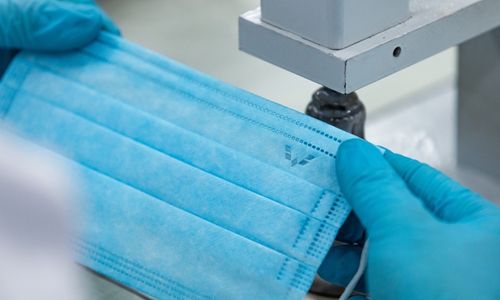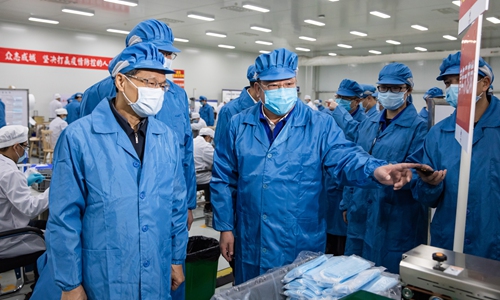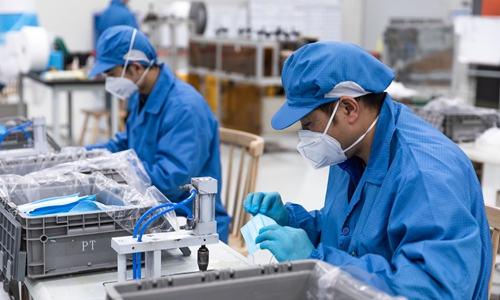HOME >> SOURCE
Impressive adaption amid epidemic unveils automaker Wuling's secret of success
By Zhang Hongpei Source:Global Times Published: 2020/2/24 17:43:40
Impressive adaption amid epidemic unveils automaker’s secret of success

A mask bearing the Wuling logo Photos: Courtesy of SGMW
It took just three days for an automaker to convert part of its production line to the manufacturing of face masks and send out its first shipment. And it took only 76 hours - instead of the 10 days it would usually take - for the factory to roll a self-developed mask-making machine off its production line in China.Located in Liuzhou, South China's Guangxi Zhuang Autonomous Region, a facility owned by Shanghai General Motors Wuling (SGMW) - a joint venture from SAIC Motor, General Motors and Liuzhou Wuling Motors to produce protective gear - was revamped on February 10.
Over the next three days, the group underwent steps to transform the auto research and development (R&D) base into a dust-free plant, installing related equipment, obtaining a certificate to produce protective goods for civilian use and providing professional training for staff.
The factory had already been producing masks using machines purchased from external suppliers since the outbreak of the coronavirus. The new automatic mask machine is expected to bring the factory's daily output to 2 million units by the end of this month; the current daily output is around 500,000 units, SGMW said in a note sent to the Global Times on Sunday.
The masks it produces, mainly disposable, are not intended for the market but for donation to frontline medics. The group will also retain a supply for its own staff.
SGMW is the country's first automaker to develop such a machine. Additionally, intelligent mobile temperature-measuring vehicles independently developed by the group were delivered to the Liuzhou government on Thursday. The vehicles, under SGMW's Bao Jun marque, can accurately identify people's faces and measure their temperatures from two meters away.
SGMW, which owns domestic marques Wuling and Bao Jun, was founded in 2002 with SAIC Motor as its largest shareholder.
Since the firm's resumption of operations last week, around 2,000 workers - nearly half its usual number - have returned to their posts to begin auto production, an SGMW PR representative told the Global Times.
"Mask-making won't affect our production of cars at the moment, and we have recovered our daily output of vehicles to 300 units, including 100 units to be exported," the representative said.
Automakers, smartphone makers and oil giants have all recently joined the fight against the novel coronavirus by shifting parts of their capacities to produce medical supplies.
State-owned GAC Motor Co on Thursday began to produce masks at a daily output of 250,000, using equipment purchased from external suppliers.
New-energy vehicle maker BYD recently told the Global Times that it has diverted part of its production line to the manufacturing of masks and disinfectant, and that it would not revert to normal until the epidemic is over.
Data from corporate information search platform Tianyancha showed that more than 3,000 enterprises have expanded their business scales to include "masks, disinfectant, protective apparel and medical equipment" since February 7.
The auto manufacturing sector has complete management systems capable of producing medical supplies, Xu Haidong, assistant secretary-general of the China Association of Automobile Manufacturers, told the Global Times on Sunday.
Compared to complicated auto production lines, mask production lines are much simpler, Xu said.

Chen Wu (first left), chairman of the Guangxi Zhuang Autonomous Region, visits SGMW's mask production facility.
Why Wuling?An image of a mask bearing the Wuling brand's logo has been circulating recently on Chinese social media. The joint venture's slogan, "We produce what the people need," has also prompted netizens to explore the history and development of the low-profile domestic brand.
This is not the first time SGMW has produced something that does not fall into its own line: It has also been involved in the production of airplanes, ships, tractors and sewing machines when the nation and market needed such products to endure economic difficulties.

Workers busy on the new mask production line
The group began in the early years of China's reform and opening-up by betting on the minivan market. The model has since become a cash cow for the group.Its classic model Wuling Sunshine ranked No. 3 on the 2011 global list of best-selling vehicles, and it was also China's first vehicle to join the list. US magazine Forbes once called it "the most important vehicle on earth."
Later models Wuling Hongguang and Wuling Rongguang also witnessed robust sales year-on-year and contributed heavily to SGMW's overall sales before the auto market began to decline two years ago.
Wuling-branded minivans are affordable in China, priced between 30,000 yuan ($4,270) and 70,000 yuan, and are of a high quality, something even the group's US partner has admired, said Feng Shiming, a veteran industry analyst based in Shanghai.
"The legendary history of the Wuling brand is mainly thanks to its focus on low costs and high efficiency in execution," Feng told the Global Times, saying its vehicles are cheaper by 10 percent or even more than those of its competitors, it has high R&D and delivery speeds and market flexibility.
"Wuling's expertise in the niche minivan market has also helped its US partner GM explore the Indian market, where demand for such an economical car is vast," said Feng.
In the Southeast Asian markets, Wuling-branded cars have been gaining popularity since its first plant in Indonesia opened in 2017. SGMW managed to seize the No. 6 position in the nation's top 10 car brands shortly after opening its plant there, reported the Xinhua News Agency.
Selling 17,000 units in 2018 alone, SGMW's business is booming in Indonesia with stores jumping from 42 in 2017 to now almost 100 across the country, according to Xinhua.
By remaining flexible to market needs while attaching importance to its own value and culture, Wuling stands out among domestic auto brands and is gaining popularity in overseas markets, analysts said.
"Wuling's story also reflects the importance of localization, especially for foreign players," said Feng.
Jia Xinguang, an independent car industry analyst, told the Global Times on Sunday that the auto brand's relative independence plays a crucial role. "Often, domestic automakers do not eagerly participate in R&D once they forge a joint venture with foreign capital, which is actually not good for long-term development."
China's auto manufacturing sector has learned a lot from foreign firms both in terms of technology and management, but that does not mean domestic players should give up their self-grown abilities and independent attitudes, said Jia.
"Unlike auto joint ventures in the late 1990s, the birth of SGMW was thanks to efforts from a foreign brand [GM] to court a domestic brand instead of the other way around," an auto industry insider who asked to remain anonymous told the Global Times.
"Liuzhou Wuling Motors (now renamed Guangxi Automobile Group Co) has a major say in the joint venture in terms of design and sales, which has been key to the Wuling brand's success over the years," the insider said.
Newspaper headline: Wuling's way out
Posted in: INDUSTRIES,COMPANIES,BIZ FOCUS